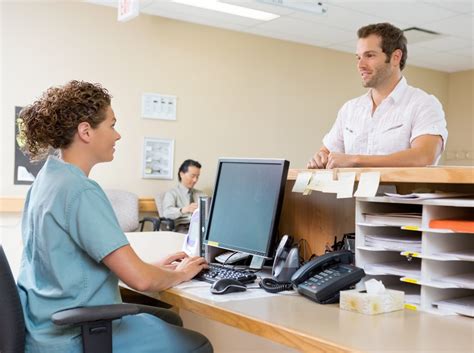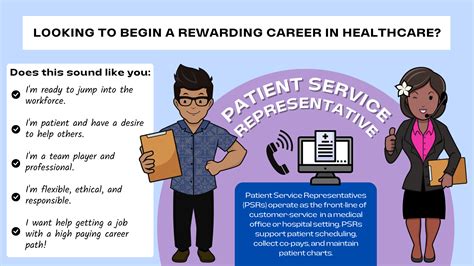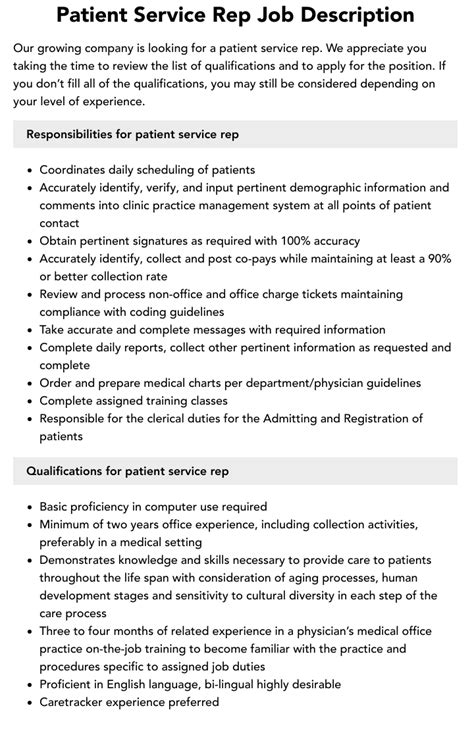Intro
Discover the vital role of a Patient Service Representative in healthcare. Learn the job description, requirements, and skills needed to excel in this position. Understand the daily responsibilities, education, and training required to provide top-notch patient care and support. Boost your career in medical administration with this comprehensive guide.
In the healthcare industry, the role of a Patient Service Representative (PSR) is vital in ensuring that patients receive exceptional care and service. As the first point of contact for many patients, PSRs play a crucial part in creating a positive experience, addressing concerns, and facilitating communication between patients, healthcare providers, and other stakeholders. In this article, we will delve into the Patient Service Representative job description and requirements, highlighting the key responsibilities, skills, and qualifications necessary for success in this role.

Key Responsibilities of a Patient Service Representative
A Patient Service Representative is responsible for providing exceptional customer service to patients, families, and healthcare providers. The primary duties of a PSR include:
- Greeting patients and families, responding to inquiries, and addressing concerns in a professional and empathetic manner
- Managing patient flow, scheduling appointments, and coordinating with healthcare providers to ensure timely and efficient care
- Processing patient registrations, updating demographic information, and verifying insurance coverage
- Handling patient complaints and resolving issues in a fair and timely manner
- Collaborating with healthcare teams to ensure seamless communication and coordination of care
- Maintaining accurate and up-to-date patient records, both electronic and paper-based
- Providing education and support to patients and families on healthcare services, policies, and procedures
Essential Skills and Qualifications
To excel as a Patient Service Representative, individuals should possess the following skills and qualifications:
- High school diploma or equivalent required; associate's or bachelor's degree preferred
- 1-2 years of experience in a healthcare or customer service environment
- Excellent communication, interpersonal, and problem-solving skills
- Ability to work in a fast-paced environment, prioritizing multiple tasks and managing competing demands
- Strong attention to detail, organizational skills, and ability to maintain accurate records
- Proficiency in electronic health records (EHRs) and other healthcare software applications
- Knowledge of HIPAA regulations and patient confidentiality guidelines
- Ability to work effectively in a team environment, building strong relationships with patients, families, and healthcare providers
Education and Training Requirements
While a degree is not always required, many employers prefer candidates with a post-secondary education in a field related to healthcare or customer service. Relevant courses or training programs may include:
- Medical terminology
- Healthcare administration
- Customer service
- Communication
- Computer applications (e.g., EHRs, Microsoft Office)

Certifications and Licenses
Certifications and licenses can demonstrate a commitment to professionalism and excellence in the field. Some relevant certifications for Patient Service Representatives include:
- Certified Patient Service Representative (CPSR)
- Certified Medical Receptionist (CMR)
- Certified Healthcare Access Associate (CHAA)
Salary and Benefits
The salary for Patient Service Representatives varies depending on factors such as location, employer, experience, and education. According to the Bureau of Labor Statistics (BLS), the median annual salary for medical receptionists, which includes PSRs, was $34,800 in May 2020.
In addition to salary, many employers offer benefits such as health insurance, paid time off, and retirement plans. Some employers may also provide opportunities for professional development and advancement.
Work Environment and Schedule
Patient Service Representatives typically work in healthcare facilities, such as hospitals, clinics, or medical offices. The work environment is often fast-paced and dynamic, with varying levels of activity throughout the day.
Schedules may vary depending on the employer and specific needs of the facility. Some PSRs may work traditional Monday-to-Friday schedules, while others may work evenings, weekends, or rotating shifts.

Conclusion
The role of a Patient Service Representative is critical in delivering exceptional patient care and service. By understanding the key responsibilities, skills, and qualifications required for this role, individuals can prepare themselves for a rewarding career in healthcare. Whether you are just starting your career or looking to advance in the field, becoming a Patient Service Representative can be a fulfilling and challenging profession.
We encourage you to share your thoughts and experiences as a Patient Service Representative in the comments below. If you have any questions or would like to learn more about this role, please don't hesitate to ask!
What is the primary responsibility of a Patient Service Representative?
+The primary responsibility of a Patient Service Representative is to provide exceptional customer service to patients, families, and healthcare providers.
What skills are essential for a Patient Service Representative?
+Essential skills for a Patient Service Representative include excellent communication, interpersonal, and problem-solving skills, as well as attention to detail and ability to work in a fast-paced environment.
What certifications are available for Patient Service Representatives?
+Some relevant certifications for Patient Service Representatives include Certified Patient Service Representative (CPSR), Certified Medical Receptionist (CMR), and Certified Healthcare Access Associate (CHAA).
